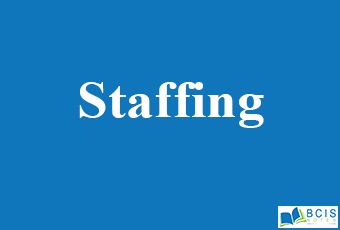
Introduction of Staffing
Staffing is an integral part of the management process. Without proper management of people, organizations cannot attain objectives. The key role that managers play in managing human resources requires that they be aware of the organization’s policies and procedures, as well as of the legal implications involved. They need to handle their responsibilities related to the selection, orientation, discipline, development, and evaluation of employees. It is the process of hiring eligible candidates in the organization or company for specific positions. In management, the meaning of staffing is an operation of recruiting the employees by evaluating their skills, knowledge and then offering them specific job roles accordingly.
Concept
The term “staffing” stands for manning various positions in the organization. The managerial function of staffing involves manning the organization structure through the proper and effective selection, appraisal and development of the personnel to fill the roles assigned to the employers/workforce.
According to Theo Haimann, “Staffing pertains to recruitment, selection, development, and compensation of subordinates.”
- Staffing is a continuous activity- This is because staffing function continues throughout the life of an organization due to the transfers and promotions that take place.
- Staffing helps in placing the right men at the right job: It can be done effectively through proper recruitment procedures and then finally selecting the most suitable candidate as per the job requirements.
- Staffing is a pervasive activity- As staffing function is carried out by all mangers and in all types of concerns where business activities are carried out.
- Staffing is performed by all managers depending upon the nature of the business, size of the company, qualifications, and skills of managers, etc. In small companies, the top management generally performs this function. In medium and small scale enterprises, it is performed especially by the personnel department of that concern.
- Staffing is an important managerial function- Staffing function is the most important managerial act along with planning, organizing, directing and controlling. The operations of these four functions depend upon the manpower which is available through staffing function.
Objectives
An objective of staffing is to be effective in determining the specific manpower needs of the business. This may vary according to season and is likely to ebb and flow based on changing economic conditions. Managers are responsible for continually assessing the employment needs of the business as it changes. Specifically, the objectives of the function are as follows:
1. To Appraisal the Performance of the Employees: It is one of the most important purposes of staffing because to improve the overall performance of the organization, the appraisal of the employee’s performance is vital.
2. To Train the Employees: Training of the employees (if they need) is also an important purpose of staffing to do specific jobs in a good manner.
3. To Train the Employees: Training of the employees (if they need) is also an important purpose of staffing to do specific jobs in a good manner.
4. To determine the source of Recruitment of the Employees: An important purpose of staffing function is to determine the sources of recruitment of the prospective employees to fill up the vacant positions in an organization.
5. To Appoint the Deserved Employees: It is also an essential objective of staffing to appoint the deserved candidates at the right job.
Importance of Staffing
It helps in promoting the optimum utilization of human resources through various aspects. Job satisfaction and morale of the workers increases through the recruitment of the right person. It helps to ensure better utilization of human resources. The importance of the staffing function can be outlined as follows:
- Reduces Cost of Production: It also plays an important role in reducing the cost of production. Because it helps in appointing the right person at the right job, at the right, time so that no wastage and mistakes can be made by efficient personnel during the production of products. Hence, it is clear that it assists in reducing the cost of production.
- Maximum and Efficient Utilization of Resources: It plays an important role in the maximum and efficient utilization of resources. Because in every organization all the resources like money, material, and machine, etc are utilized efficiently through specialized manpower and specialized manpower can only appoint in an organization through a good staffing system. Thus, we can say that it helps in the maximum and efficient utilization of resources.
- For maintaining Co-ordination among the Employees- It plays a prominent role in establishing unity and coordination among the employees. Because it assigns their jobs according to their ability, talent, aptitude, and specializations which makes them involved in their tasks and ensure healthy and co-operative relationship among the employees.
- For meeting Present and Future Needs of Employees- It is very important for fulfilling the present as well as the future needs of employees. Because it gives a clear picture to the organization that in the coming year how much positions will be vacant and new positions will be established. So that organization can fulfill those vacant and new positions by appointing the deserved candidates. Thus, it is clear that staffing fulfills the present and future needs of employees in an organization.
You may also like: Techniques Of Group Decision Making

Leave a Reply